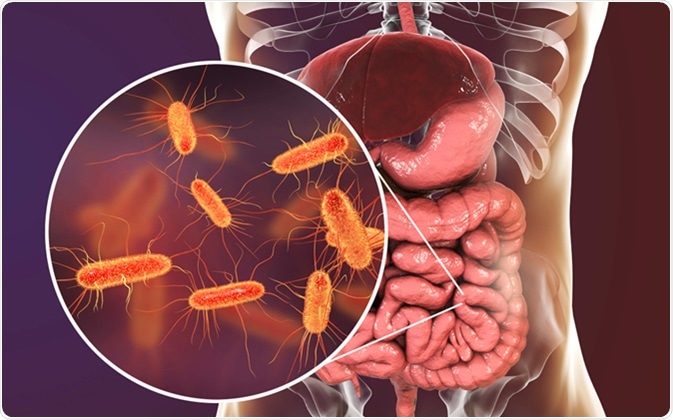Human body hosts 10-100 trillion microbes (small microorganisms such as bacteria, viruses and fungi) and their groupings or community is referred to as microbiota. The complete collection of genes of all the microbes in a community is termed as microbiome.

Intestinal microbiome, 3D illustration showing anatomy of human digestive system and enteric bacteria Escherichia coli, E. coli, colonizing jejunum, ileum, other parts of intestine. Gut normal flora. Image Credit: Kateryna Kon / Shutterstock
Microbes and Human Body
Microbes start inhabiting the human body soon after the birth. They colonize in the areas exposed directly to the environment such as human respiratory tract (most commonly the nose), the skin (especially lined with the mucous membrane such as groin), the urinary tract, and the digestive tract (mainly colon and the mouth).
Generally, the microbes live in mutualistic relation with the human body (host) where both the host and the microbes are benefitted, or in communalistic relation where the microbes are benefitted but the host (human body) is neither benefitted nor harmed. However, this relationship can also become negative where the microbes benefit at the expense of the host.
Research suggests that when these microbes are disturbed from their natural environment, such as by excessive use of antibiotics, or the changes in the diet, or if new pathogens invade the body, this positive mutualistic relation becomes negative.
Microbiome and Colorectal Cancer (Lower Gastrointestinal Cancer)
Colorectal cancer (CRC) is the third most common form of cancer. New technologies such as metagenome sequencing have made it possible to understand the relationship between the microbiome and colorectal cancer. Microbes inhabit different sites in the gut, including ascending colon, distal colon, proximal ileum, and jejunum; and they play a crucial role in maintaining its healthy functioning. This natural flora helps in the food digestion, vitamin biosynthesis, and protection from pathogens.
Dysbiosis is a condition when these microbes become imbalanced in the gut. Studies have indicated that imbalance in the community of gut microbes is associated with CRC development. Also, there is a scope of managing gut bacteria which can help in curing the CRC.
Some bacteria and their roles are as below:
- CRC growth is stimulated by a bacteria known as Fusobacterium nucleatum. This bacteria is responsible for either activating the Wnt signaling pathway or lowering down the CD3þ T cell-mediated immunity, which leads to the growth and development of the tumor cells.
- Escherichia coli (E. coli) is another microbe found in intestinal microbiota. Research suggests that pathologic strain of E. coli plays a critical role in triggering CRC. E. coli can induce inflammation and has been found to release certain chemicals such as cytolethal distending toxin (CDT) and cytotoxic necrotizing factor (CNF) which can induce carcinogenesis.
- Bacteroides fragilis (B. fragilis) bacteria has two major forms - nontoxigenic B. fragilis (NTBF) and enterotoxigenic B. fragilis (ETBF). ETBF is responsible for causing the CRC. ETBF infection increases the levels of T-helper cell 17 (Th17) and T regulatory (Treg) cells, which promote the tumor growth and development.
- Bifidobacterium has been found to be protective in CRC. It reduces the beta-glucuronidase activity, and in CRC its levels are found to be significantly reduced.
- Lactobacillus has also been found to be beneficial in reducing CRC. It produces lactic acid, activates toll-like receptors, and reduces inflammation.
Breast Cancer and Endometrial Cancer
Researchers have found that there is a difference in bacteria found in breasts of women with breast cancer and the ones without the disease. In case of endometrial cancer, similar results were observed which indicated that the microbes found in the vaginal environment of women with endometrial cancer were different from the microbes in the vaginal environment of healthy women.
Microbiome and Upper Gastrointestinal Cancer
Studies performed by the International Agency for Research on Cancer have indicated that Helicobacter pylori has a carcinogenic nature. Certain risk factors such as use of tobacco, high body mass index, and altered pepsinogen levels, are associated with disturbing the microbial balance and thereby increasing the risk of gastric cancer.
Role of the Human Microbiome in Immunotherapy
Immunotherapy is becoming a modern tool in treating cancer, where the natural immunity is strengthened to combat cancer, and the role of microbiome is becoming a promising tool in aiding immunotherapy.
The type and variety of bacteria in the gut can have a major effect on the results of immunotherapy. Studies indicate that individuals who had a high ratio of beneficial bacteria were more likely to respond to these drugs compared to those who had less number of good and more number of harmful bacteria.
Research has also indicated that manipulating the microbes in the patients who are less responsive to immunotherapy has shown benefits. Once their microflora is regulated and replaced with healthy microbiota, the immune system becomes more responsive in recognizing the tumors. Also, diverse microflora has the ability to modify the overall response of immunotherapy drugs.
Further Reading
Last Updated: Oct 12, 2022